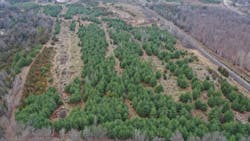Metrolinx renews agreement with Toronto and Region Conservation Authority
Metrolinx has renewed its agreement between the Toronto and Region Conservation Authority (TRCA) to help manage the upcoming portfolio of construction work that includes subways, rapid transit, new stations and GO expansion.
With the amount of transit expansion infrastructure Metrolinx will be building over the coming years, tending to the natural environment is crucial to working across a vast landscape. The new and improved transit systems will connect municipalities and communities across the region, but new infrastructure and new services also require space and easy access for customers and maintenance crews.
Metrolinx is building transit through some of the most densely developed areas in Canada. And although the transit agency says it is committed to minimizing impacts and going over and above in terms of compensation, some change in the land and urbanscape is inevitable.
The renewed agreement formalizes TRCA dedicating staff and necessary resources for technical support, detailed design and voluntary project review, as well as environmental assessment (EA) planning of Metrolinx applications related to environmental approvals and sustainability.
With the anticipated increase in project requirements, TRCA will help deliver a crucial third-party review to make sure the transit needed within the region is built in a sustainable way.
“Metrolinx has a long-standing relationship with TRCA,” said Matt Clark, Metrolinx chief capital officer. “We have been leaning on their expertise in habitat preservation and restoration, as well as application of municipal regulations. The partnership has been instrumental in helping Metrolinx deliver infrastructure projects within the conservation agency’s jurisdiction and it will be more important than ever over the next few years.”
This agreement will ensure that Metrolinx is in the best position to deliver the new large-scale projects with the very best advice about sustainability in mind.
“TRCA is pleased to continue our important work with Metrolinx to help ensure that negative environmental impacts from transit projects are avoided to the extent possible, and if unavoidable, compensated for by restoration works including tree plantings and habitat creation in priority areas across our region,” said John MacKenzie, CEO, TRCA.
“TRCA’s work with Metrolinx includes providing technical reviews based on our scientific expertise and knowledge of local watershed ecosystems to inform the planning, detailed design, and construction of specific transit projects. The Agreements we are putting in place today will allow TRCA to continue providing expert advice to Metrolinx on significant transit projects currently under review across our rapidly growing region for many years to come,” added MacKenzie.
Looking forward, Metrolinx will be working with communities along existing and future corridors to understand their needs, while planting seeds of transit expansion for the future.
